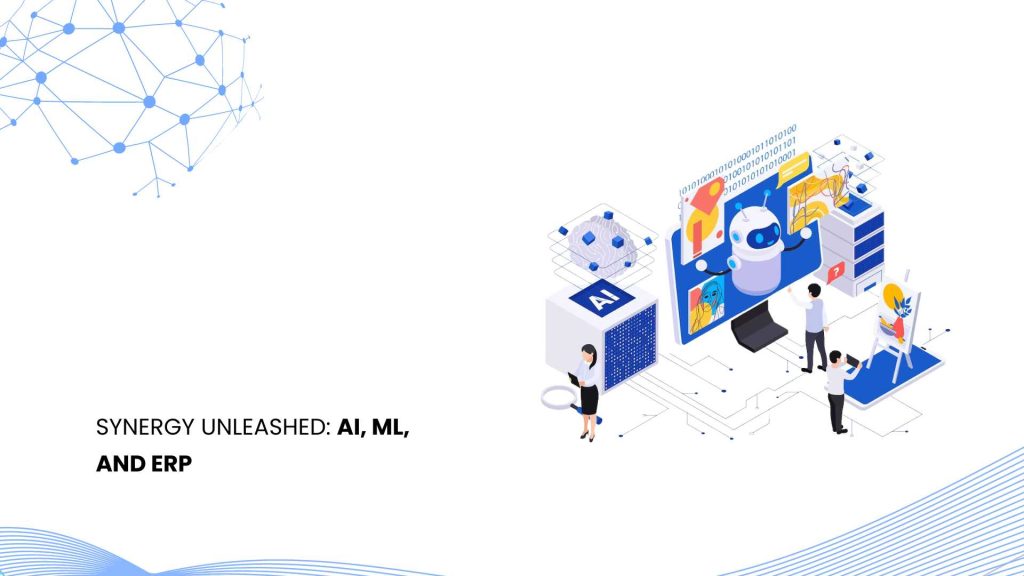In the ever-evolving technological innovation landscape, the dynamic duo of Artificial Intelligence and Machine Learning has emerged as a transformative force, reshaping the operational landscape of businesses. Integrating these advanced technologies becomes particularly pivotal when exploring their cloud ERP applications. We delve into the nuances that distinguish AI from ML and unravel their collective impact on ERP systems.
AI vs. ML: Decoding the Essence
Artificial Intelligence (AI)
At its core, AI refers to developing machines that can execute tasks that typically require human intelligence. This overarching concept encompasses various capabilities, from natural language processing to problem-solving and decision-making.
Machine Learning (ML)
Machine Learning, on the other hand, is a subset of AI that focuses on creating algorithms capable of learning and improving from experience. In essence, ML provides the mechanism through which machines can autonomously enhance their performance over time. It is a dynamic field that enables systems to adapt and evolve without explicit programming.
In simpler terms, AI is the broader concept, while ML serves as the engine through which machines acquire the ability to learn and make decisions independently.
Empowering ERP with AI and ML
Integrating AI and ML into ERP systems opens up possibilities, enhancing efficiency, accuracy, and decision-making. Here are five key areas where these technologies are making a significant impact:
Predictive Analytics
AI and ML empower ERP systems with predictive analytics, enabling companies to forecast coming trends and outcomes. These technologies can identify and make predictions by analyzing historical data, aiding businesses in strategic planning, inventory management, and resource allocation.
Fraud Detection and Security
Incorporating AI and ML into ERP systems strengthens the security infrastructure by enabling robust fraud detection mechanisms. These technologies can analyze vast datasets in real time, identifying anomalies and potential security threats. This proactive approach safeguards sensitive information and financial transactions within the ERP ecosystem.
Smart Automation
AI and ML-driven automation revolutionize mundane and repetitive tasks within ERP systems. These technologies can optimize workflows, streamline processes, and reduce manual intervention, increasing efficiency and lowering operational costs. Smart automation also enhances data accuracy, mitigating the risk of human errors.
Personalized Insights
The amalgamation of AI and ML facilitates the generation of personalized insights within ERP systems. These technologies can tailor recommendations, reports, and dashboards to individual users by analyzing user behavior, preferences, and historical data. This level of personalization enhances user experience and decision-making capabilities.
Supply Chain Optimization
AI and ML are pivotal in optimizing supply chain management within ERP systems. These technologies analyze vast inventory levels, demand forecasting, and supplier performance datasets. By identifying patterns and trends, ERP systems can optimize supply chain processes, reduce lead times, and enhance efficiency.
The Synergy Unleashed: AI, ML, and ERP
The true potential of AI and ML is realized when integrated seamlessly into ERP systems. The synergy between these technologies empowers businesses with unparalleled capabilities, transforming traditional ERP into intelligent, adaptive, and predictive methods. The collaborative impact includes:
Enhanced Decision-Making
AI and ML provide ERP systems with the ability to make real-time, data-driven, informed decisions. The continuous learning aspect of ML ensures that the system evolves and adapts to changing business dynamics, ultimately enhancing the decision-making process.
Improved Efficiency and Productivity
Automation driven by AI and ML streamlines ERP processes, reducing manual efforts and enhancing overall efficiency. It accelerates task completion and causes workers to focus on more strategic and value-added operations, increasing productivity.
Agility and Adaptability
The adaptive nature of AI and ML enables ERP systems to respond swiftly to changing business requirements. The system can adapt to market trends, customer preferences, or regulatory changes, ensuring the organization remains agile and more responsive in a dynamic business atmosphere.
Competitive Advantage
Businesses embracing AI and ML integration into their ERP systems gain a competitive edge. H harnessing advanced analytics, automation, and predictive capabilities positions firms to stay ahead of the curve, innovate faster, and deliver superior customer experiences.
Conclusion
Acumatica Cloud ERP stands as a testament to the transformative potential of an intelligent platform. By seamlessly integrating Artificial Intelligence and Machine Learning, Acumatica Cloud ERP empowers employees to leverage their skills to the fullest extent, fostering a sense of fulfillment in their roles.
It enhances individual job satisfaction and positions the business as an attractive prospect for prospective employees. Cutting-edge technology and human expertise within Acumatica elevate operational efficiency. It underscores a commitment to creating a workplace where innovation and employee satisfaction coalesce for a thriving and forward-looking organization.

Vijay comes with a vast experience in ERP and enterprise solutions space with about 20 years of experience in various packaged application like Acumatica, SAP, Orion, Salesforce.com, SugarCRM and, SalesLogix.

